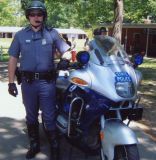 The Joint Commission on Transportation Accountability yesterday released an interim analysis of the effect of Virginia's so-called abusive driving fees that add taxes of up to $3000 to various motoring offenses ( fee details). Courts began collecting the fees in July, driving 177,000 voters to call for their immediate repeal in an online petition. The report's figures show that the majority of revenue actually collected will come from speeding offenses that are subject to the new fees ($22 million). Both driving under the influence of alcohol ($20 million) and serious driving felonies ($38,000) will generate less revenue, contrary to the assertion of fee proponents.
The Joint Commission on Transportation Accountability yesterday released an interim analysis of the effect of Virginia's so-called abusive driving fees that add taxes of up to $3000 to various motoring offenses ( fee details). Courts began collecting the fees in July, driving 177,000 voters to call for their immediate repeal in an online petition. The report's figures show that the majority of revenue actually collected will come from speeding offenses that are subject to the new fees ($22 million). Both driving under the influence of alcohol ($20 million) and serious driving felonies ($38,000) will generate less revenue, contrary to the assertion of fee proponents. While the study finds it too early to conclude the program has had any positive effect on safety, the ticket tax appears to have changed the way some police handle traffic stops.
"The magnitude of the deterrent effect, if any, is not readily discernible," the report found. "One possible effect of the abusive driver fee program is that... more speeding summons are being issued for conduct that fits the statutory definition of reckless driving."
Between July and October 2007 the number of arrests for reckless driving had fallen 10.6 percent (892 tickets per month) while the number of arrests for speeding increased 7.6 percent (1320 tickets per month) to compensate. The police officers reluctant to impose the $1050 tax that comes with a reckless driving charge are cutting some motorists a break and writing simple speeding citations instead.
Another side effect of the fees noted in the report is an expected explosion in the number of unlicensed drivers on the road. The new law mandates that anyone who fails to pay an abuser fee loses his license, resulting in an estimated 137,000 additional motorists losing their license in the next fiscal year and another 181,000 by 2009. This means nearly a quarter million people will be driving without a license and without insurance within the next two years, according to compliance data from the American Association of Motor Vehicle Administrators.
Another 138,126 Virginia motorists (2.5 percent of registered drivers) will be affected by the "point tax" as this number already have a sufficient number of points on their drivers' licenses to trigger mandatory annual payments of between $100 and $700. In addition, 30,934 annually will face the $1050 tax for speeding. Although the fee supporters emphasize that only "reckless" drivers are eligible for the tax, the report shows that 43 percent of all reckless driving convictions went to individuals whose only crime was driving in excess of 80 MPH. On Interstate 85, for example, driving just 10 MPH over the newly established 70 MPH maximum triggers the tax.
Handing out abuser fees to speeders by classifying their actions as "reckless" is essential to the success of the fee program because ordinary speeders are most likely to pay their fines in full. In 2005, the collection rate for habitual offenders operating on a suspended license was just five percent. Drivers accused of going 20 MPH over a limit near a school crossing paid up ninety percent of the time.
The report also showed that certain miscellaneous offenses generate substantially less revenue than speeding. For example, only 91 motorists per year were convicted of reckless driving for failure to use a turn signal. An average of three motorists per year were convicted of "operating a vehicle with a smokescreen or flamethrower" in violation of Virginia Code Section 46.2-1086. All together, these will generate about $100,000 in abuser fee revenue.
A number of factors will reduce the grand total of revenue collected by the fees ( view table of violation revenue). Out-of-state drivers make up seven percent of Virginia driving convictions, and they do not pay the new fees. The overhead cost required to collect the fees is estimated to reduce total profit by eighteen percent. Each type of violation also has a historic collection rate of as little as five percent, further reducing the total revenue expected to around $65 million a year by 2010. The report casts some doubt upon even this figure citing the experience of New Jersey and Texas which showed that collection rates decreased as the fees skyrocketed over $1000.
View the full fee report in a 264k PDF file at the source link below.
Article Excerpt:
Annual number of violations for each fee category, with the total potential amount in fees issued over a three-year period and the average collection rate for each type of offense :Source:
Offense/Fee Annual
TicketsTotal Fees
(3 years)Collection
Rate
Speeding/reckless
$105085,506 $89,781,300 59% Suspended
$75051,912 $38,934,000 13% DUI
$225027,966 $62,923,500 44% Felony
$30003,457 $1,037,100 5% Other
$90075,764 $68,187,600 30%
--
RMSTringer
+++++++++++++++


No comments:
Post a Comment